Transcription
HEARING DATE AT WOBURN SUPERIOR COURT
March 28, 2013
BY: Luis D. Perez
http://betweenthebars.org/blogs/350/luis-d-perez
NCCI-GARDNER, P.O. Box 466
Gardner, Massachusetts 01440
I want to take this opportunity to thank my brothers and sisters from the Church "Asamblea Iglesias Cristianias - NUEVA JERUSALEN de Worcester, Massachusetts". My family and friends are also very grateful for their attendance at the Courthouse on March 21, 2013.
The case was presented as a pro-se prisoner, the Judge hear the entire argument in connection to the new federal ruling on Miller v. Alabama & Jackson v. Hobbs, allowing juvenile offenders to have their sentence reduced.
The main issue in question was individual minors under 21 years of age and those 18 years old, when in fact, the criminal statute does not have a saving clause or severability clause between the CRIMINAL statutes of G.I. c. 265 1 and 2. The criminal statutes does not have any specification on MINORS (or) JUVENILES being transferred into adult court. - That there was a violation of due process, age discrimination and the Equal Protection Clause of the XIV Amendment of the United States Constitution.
I also presented a JURISDICTIONAL DEFENSE along with my placement under the "Convention Against Torture" signed by the United States on April 18, 1988, - Inhumane or Degrading treatment or punishment. The Federal Law on torture prohibits conduct specifically intended to inflict severe physical or mental pain. The treaty works both ways. Massachusetts is part of the United States and the Court has the obligation to honor the treaties signed by the United States at the United Nations.
Along with this letter I attached a copy of the United Nations Treaty which the U.S. Department of Justice has me under.
I can't be transferred to Cuba because of potential torture and execution there, but again, this U.N. Treaty works both ways, because I am suffering mental anguish and psychological torture knowing that I am slowly dying in prison, while I have been seeing the Massachusetts Administration of Justice being applied differently to other people in society.
For example John Motorano, killed 19 people himself and received 11 years sentence. - The last (2) speakers of the House have been convicted of corruption charges, even Senators and Representatives being convicted of criminal enterprises. The list is so big that I don't have time to mention those events in the past 35 years. - Now the Probation Department in Massachusetts is under indictment and I have to die in prison being held by a bunch of crooks.
The case was taken under advisement, there was two additional comments to make on the issues and I'm hopeful because the Judge was respectful and patient as well as the lawyer from the Department of Correction. As soon as I receive the Court Ruling, I will be publishing the report, so the people who are interested can go CYBER and express their own opinion.///
Luis D. Perez
Decision of the Board of Immigration Appeals
U.S. Department of Justice
Executive Office for Immigration Review
Falls Church, Virginia 22041
File: A17 722 600 - Concord
Date: Oct 23 2000
In re: LUIS DEMETRIO PEREZ-SANCHEZ
IN REMOVAL PROCEEDINGS
APPEAL
EXHIBIT A
ON BEHALF OF RESPONDENT: Pro se
ON BEHALF OF SERVICE:
Richard G. Buyniski
Assistant District Counsel
John M. Furlong, Jr.
Assistant District Counsel
CHARGE:
Notice: Sec. 212(a)(2)(A)(i)(I), I&N Act [8 U.S.C. 1182(a)(2)(A)(i)(I)] - Crime involving moral turpitude
APPLICATION: Relief under the United Nations Convention Against Torture
In a decision dated April 11, 2000, an Immigration Judge found the respondent subject to removal as charged above, but granted the respondent's application for deferral of removal under the United Nations Convention Against Torture. The Immigration and Naturalization Service has appealed. The appeal will be dismissed.
The respondent is a 49-year-old male, native and citizen of Cuba. The record reflects that the respondent was granted political asylum in Mexico on October 6, 1966, shortly after his departure from Cuba. The respondent was admitted to the United States as a lawful permanent resident on April 16, 1967. The record further reflects that on January 23, 1973, the respondent was convicted in the Middlesex Superior Court at Cambridge, Massachusetts, for murder in the first degree and sentenced to life imprisonment. Removability is not at issue. The Service argues that the Immigration Judge erred in determining that the respondent has met his burden of establishing entitlement to deferral of removal under the Convention Against Torture.
A17 722 600
We affirm the decision of the Immigration Judge insofar as it finds that the respondent has established eligibility for deferral of removal under the Convention Against Torture, (1) for the reasons set forth in that decision. See generally Matter of Burbano, 20 I&N Dec. 872 (BIA 1994). We agree that the testimony and evidence of record meet the respondent's burden of showing that it is more likely than not that he will be "tortured" if removed to Cuba, as that term is defined in the regulations. See 8 C.F.R. 208.17 (2000); Matter of S-V-, Interim Decision 3430 (BIA 2000). We add the following.
The findings of an Immigration Judge regarding matters of credibility are ordinarily given significant deference, since an Immigration Judge hears an applicant's actual testimony and is the best position to observe an applicant's demeanor. See, e.g. Matter of Burbano, supra; Matter of Kulle, 19 I&N Dec. 318 (BIA 1985), aff'd, 825 F.2d 1188 (7th Cir. 1987), cert. denied, 484 U.S. 1042 (1988). Moreover, we find that the Immigration Judge's favorable credibility determination in this case is supported by the record. See Matter of A-S-, 21 I&N Dec. 1106 (BIA 1998). The Service argues on appeal that the respondent has failed to provide adequate corroboration evidence to support his claim. More specifically, the Service submits that the respondent failed to independently corroborate any connection between himself and an organization known as 'Cuban Representation in Exile" - a critical aspect of his claim. (2) In this regard, the Service notes that respondent's request for information from the Central Intelligence Agency (CIA) resulted in a written response reflecting that the CIA had no record or information relevant to the respondent's inquiry. However, the response from the CIA (Exhibit 7), dated May 8, 1986, goes on to indicate that many records maintained by the agency concerning foreign intelligence surveillance remain classified and, therefore, the response in question should not be construed "as either confirming or denying the existence of FISA (Foreign Intelligence Surveillance Court) records within the scope of the [respondent's] request." We are satisfied that the failure to provide this particular type of independent evidence is excusable under the circumstances of this case. See Matter of S-M-J-, 21 I&N Dec. 722 (BIA 1997) (necessity of corroborative evidence when available). Moreover, the respondent's claim in this case comports with known country conditions as reflected in the ample and reliable documentary evidence of record. An applicant's testimony alone may be sufficient to sustain the burden of proof without corroboration if credible in light of known general conditions in the applicant's country of nationality. See generally, 8 C.F.R. 208.13(a) (2000). We have reviewed the arguments made by the Service on appeal, and do not find that they present any reason to disturb the decision of the Immigration Judge. Accordingly, the appeal will be dismissed.
1. Convention Against Torture and Other Cruel, Inhuman or Degrading Treatment or Punishment, adopted and opened for signature Dec. 10, 1984, G.A. res. 39/46 (annex, 39 U.N. GAOR Supp. (No. 51) at 197), U.N. Doc. A/39/51 (1984) (entered into force June 26, 1987; for the United States Apr. 18, 1988) (Convention Against Torture or Convention).
2. The respondent claims to have been affiliated with this Florida-based organization which sponsored infiltration raids into Cuba, and which, according to the respondent, was occasionally financed by the Central Intelligence Agency.
A17 722 600
ORDER: The appeal is dismissed.
[signature]
FOR THE BOARD
features
1. Understanding the Second Chance Act
Five years of advocacy made the Second Chance Act a reality. What is it and who does it affect?
6. Crack hearings continue on Capitol Hill
Will Congress act to correct unjust crack cocaine laws?
8. Steps for filing a commutation petition
We show you the right moves for filing an effective commutation petition.
13. Mothers speak out
Four Massachusetts mothers urge other families to work with them for reform.
departments
6. Federal news
10. Litigation
13. State news
17. Is justice being served?
19. FAMM outreach
SUMMER 2008
ISSUE 2 | VOLUME 18
Second Chance Act becomes law
"The country was built on the belief that each human being has limitless potential and worth. Everybody matters."
President George W. Bush
The Second Chance Act, legislation designed to aid formerly incarcerated people coping with the challenges of reentry, was signed into law by President George W. Bush on April 9. Lawmakers from across the political spectrum and representatives from many of the advocacy groups who worked for more than five years to see this important legislation become law packed the signing ceremony in Washington.
"The country was built on the belief that each human being has limitless potential and worth. Everybody matters", said Bush during the signing ceremony. "We believe that even those who have struggled with a dark past can find brighter days ahead. One way we act on that belief is by helping former prisoners who've paid for their crimes - we help them build new lives as productive members of our society."
Championed by Representatives Danny Davis (D-Ill.) and Chris Cannon (R-Utah) and Senators Joseph Biden (D-Del.), Arlen Specter (R-Pa.), Sam Brownback (R-Kan.), and Patrick Leahy (D-Vt.), the Second Chance Act enjoyed broad bipartisan support and passed by unanimous consent.
But what exactly does the Second Chance Act do and who does it affect? To answer those questions, FAMM analyzed the new law and put together answers to the most frequently answered questions.
OFFICE DES NATIONS UNIES A GENEVE
CENTRE POUR LES DROITS DE L'HOMME
UNITED NATIONS OFFICE AT GENEVA
CENTRE FOR HUMAN RIGHTS
Palais des Nations
CH-1211 GENEVE 10
Telefax: (022) 733 98 79
Telegrammes: UNATIONS, GENEVE
Telex: 28 96 96
Telephone: 734 60 11 731 02 11
REF No: G/SO 215/1 USA
(a rappeler dans la reponse)
11 February 1992
Your communication dated 7 October 1991
Dear Mr. Perez,
This is to acknowledge the receipt of your communication referred to above, the contents of which have been noted.
Yours sincerely,
Jakob Th. Moller
Chief, Communications Section
Centre for Human Rights
Mr. Luis Perez
P.O. Box 466
Other posts by this author
|
2023 feb 2
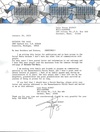
|
2022 dec 26
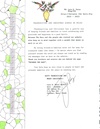
|
2022 nov 5
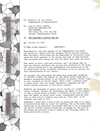
|
2022 aug 23
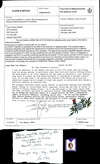
|
2022 jun 23
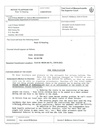
|
2022 may 4
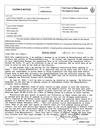
|
More... |

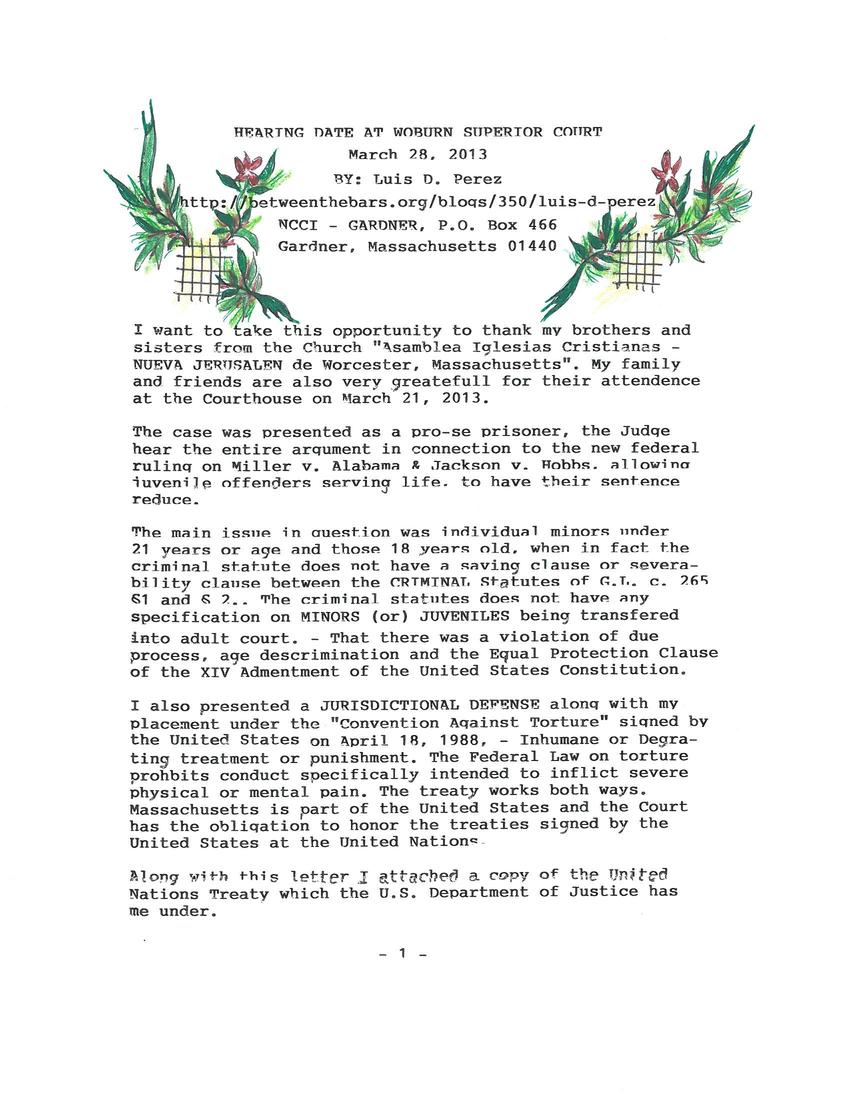
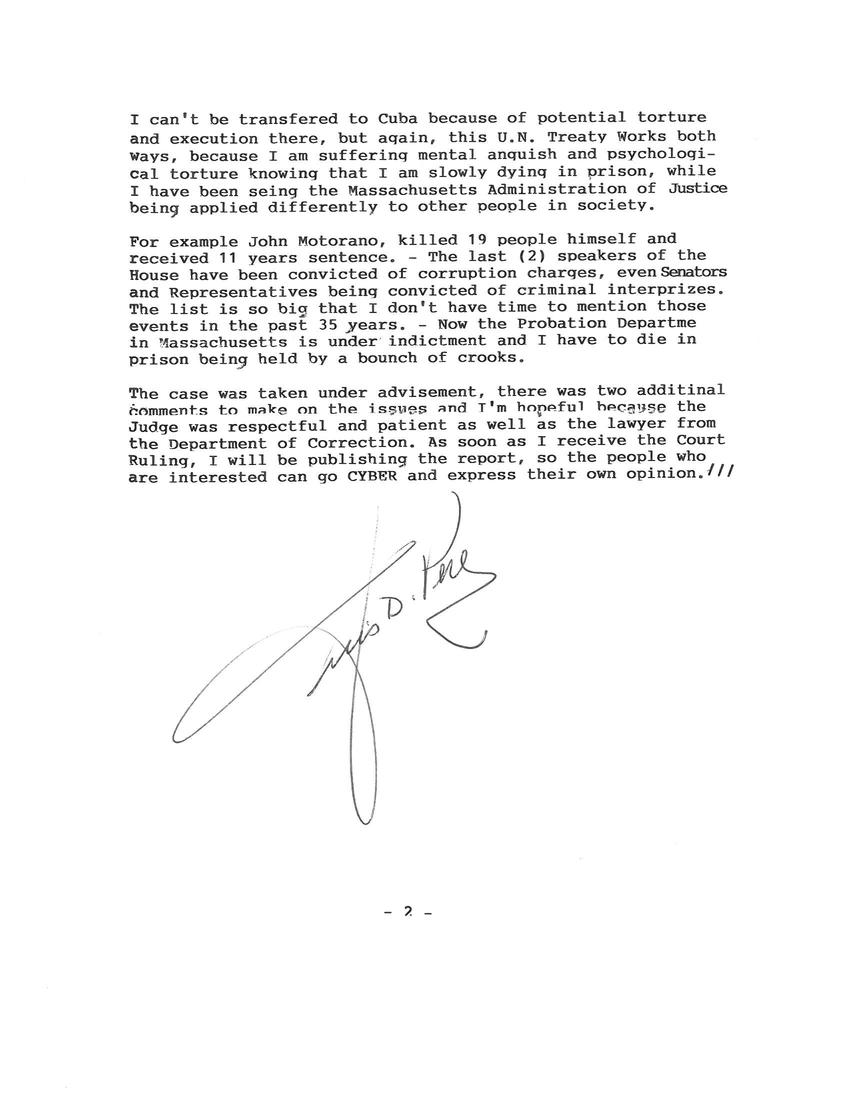
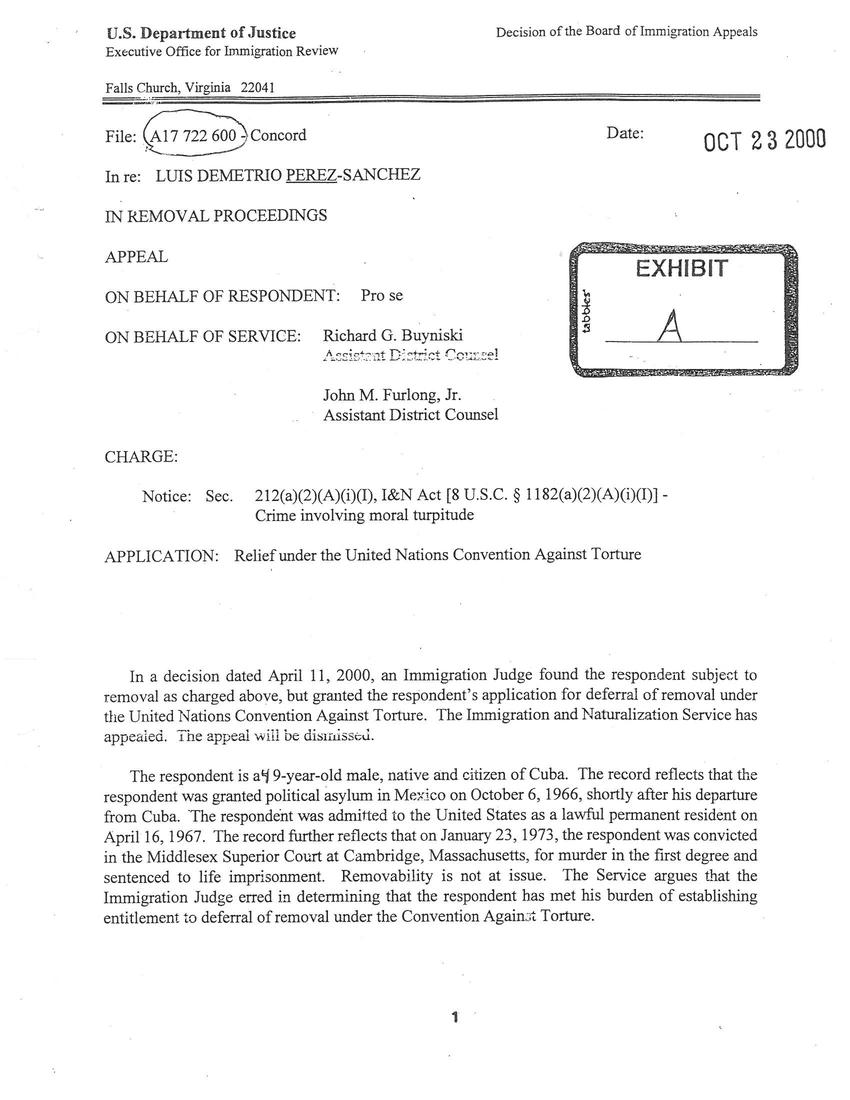
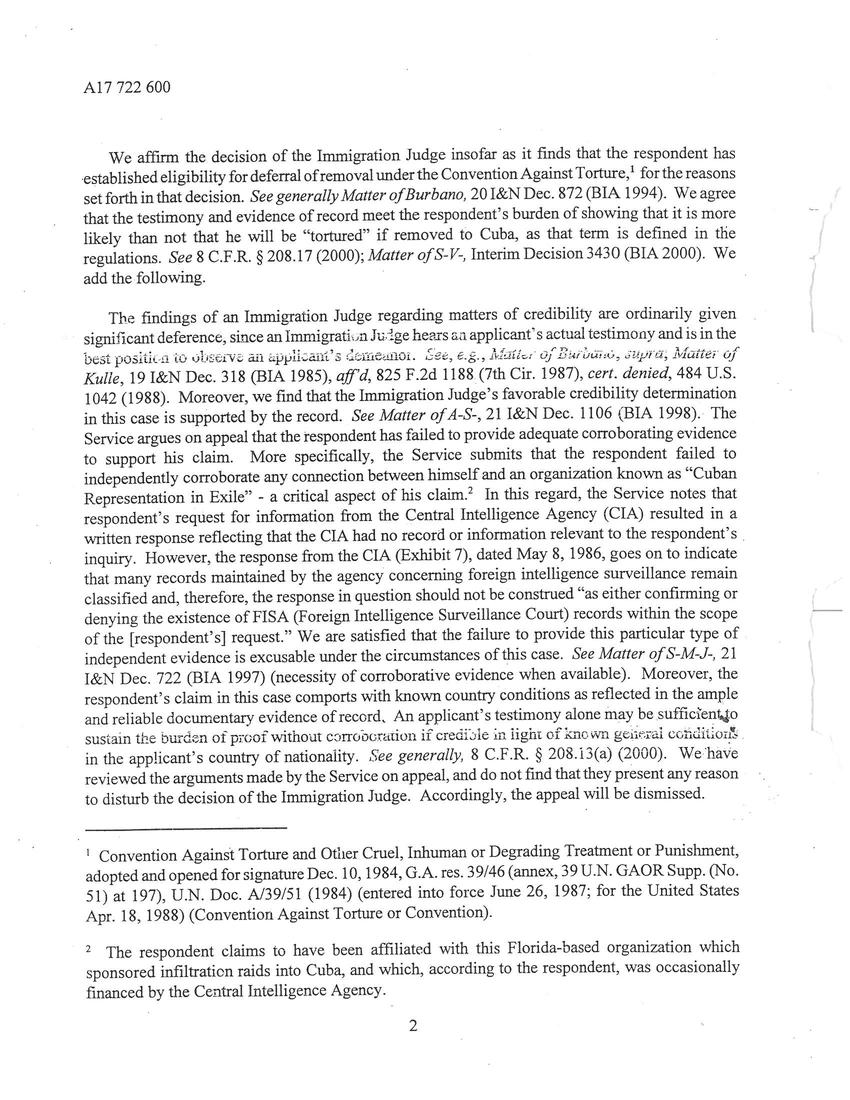
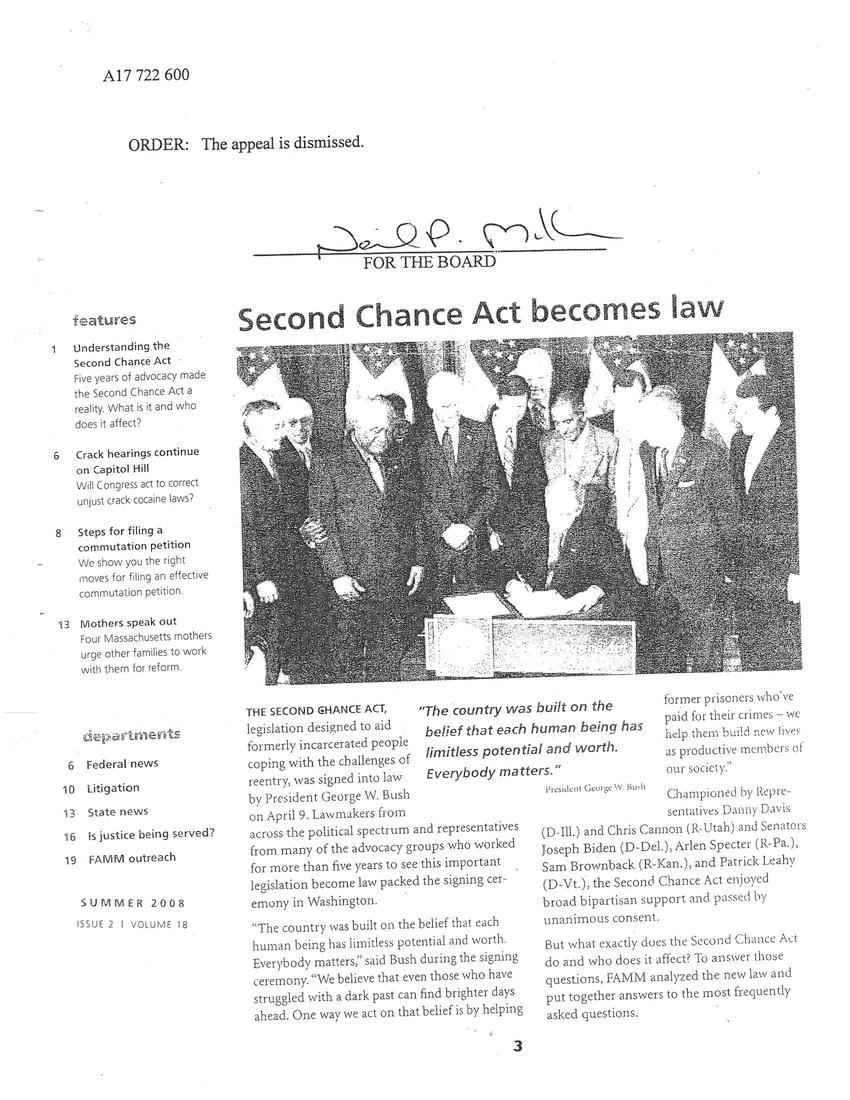
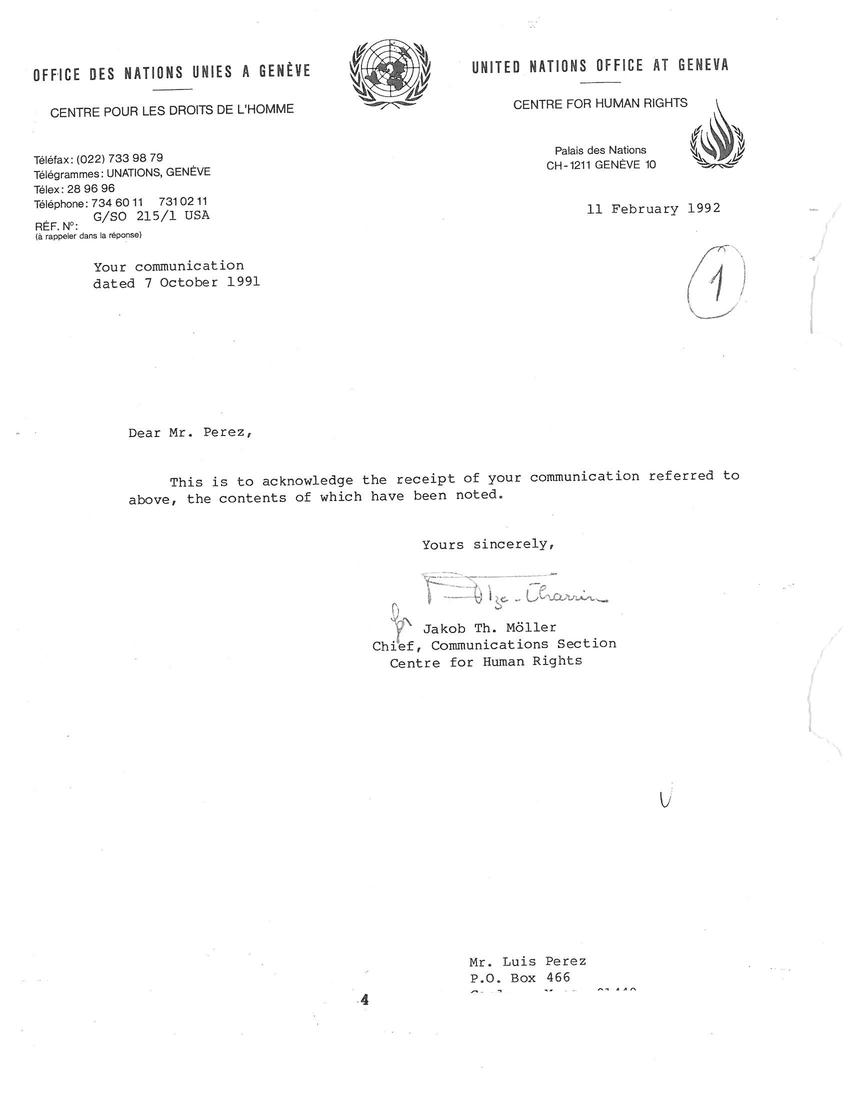

Replies